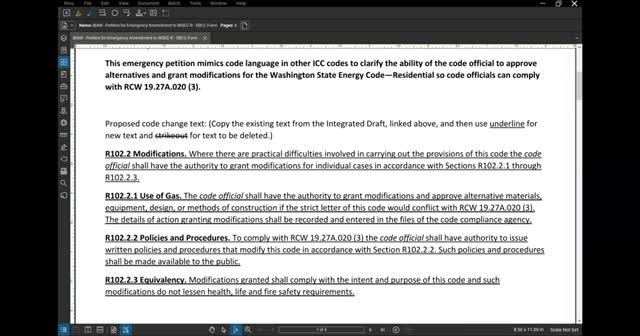BIAW petition over Initiative 2066 prompts council to schedule special meeting for formal response
Get AI-powered insights, summaries, and transcripts
Subscribe
Summary
The Building Industry Association of Washington asked the Code Council to adopt emergency language to help local jurisdictions interpret Initiative 2066. The council heard public comment, discussed options and set a special meeting to respond within the 60‑day window required by rulemaking procedures.
The Building Industry Association of Washington filed a petition asking the Washington State Building Code Council to adopt emergency residential energy code language addressing conflicts raised by Initiative 2066. The petition was the focus of extended public comment on Jan. 24, during which builders and municipalities described inconsistent local approaches and requested state guidance.
Petition and public comments: Patrick Hanks of the Building Industry Association of Washington told the council the petition is intended to “strengthen the ability for code officials to grant alterations and modifications” while the council proceeds with permanent rulemaking to implement I‑2066. Multiple speakers — including builders and some local building officials — said jurisdictions are taking different approaches (some implementing I‑2066 immediately, others waiting on litigation or state guidance) and that the lack of uniform direction is creating confusion and costs.
Legal and process limits: Council staff and the assistant attorney general explained the petition required a formal council response under the Administrative Procedure Act. Staff said the council could not adopt an emergency rule at this meeting because of filing timing and procedural notice requirements, but must respond to the petition within 60 days of receipt. The staff noted the response deadline for the petition is Feb. 15, 2025.
Council action: The council agreed it must schedule a special meeting to consider the petition and other off‑cycle requests. Staff said they would post meeting notice and supporting documents and coordinate the special meeting to allow the council to either deny the petition or initiate emergency rulemaking as the APA requires.
Why it matters: Initiative 2066 changed the statutory landscape for energy codes, and testimony at the meeting showed local jurisdictions are interpreting and applying I‑2066 differently. Petitioners said the requested emergency language would clarify how local code officials may approve alternatives or modifications; opponents and some officials urged full technical review by tags and careful coordination with existing statutory limits.
Next steps: Council staff will schedule the special meeting and publish the petition, supporting comments and staff analyses. The council will take formal action on the petition at that special meeting; if emergency rulemaking is initiated, it will follow the statutory emergency‑rule filings and subsequent CR‑102/CR‑103 permanent rulemaking.
